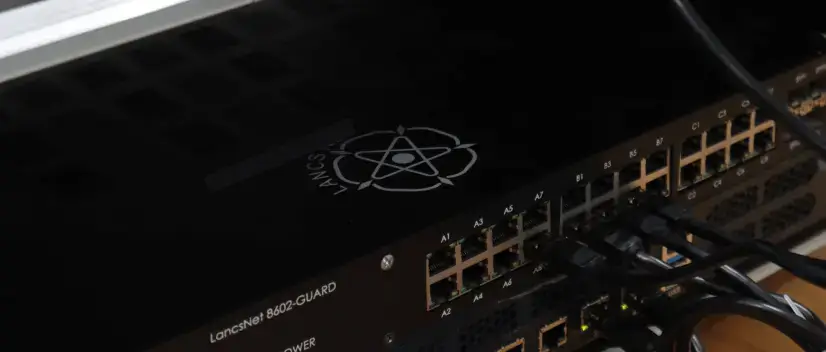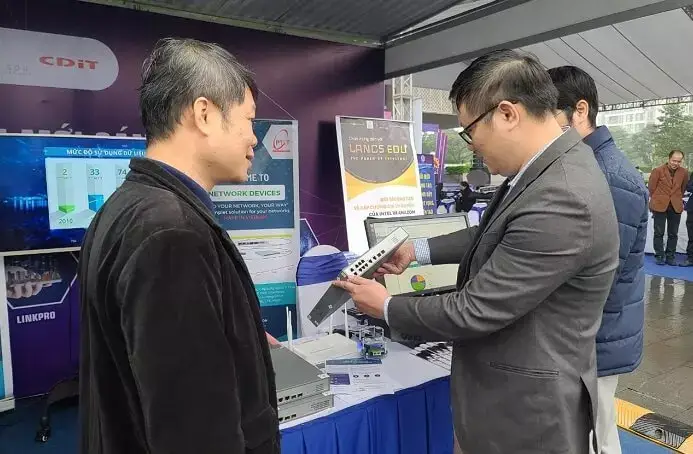Lancs Networks, a startup company in Hanoi, is owning core technology for programming and manufacturing “clean” hardware and software devices with high security.

In terms of microcontroller programming, there are chips that are pre-designed by the manufacturer, cannot be changed or modified by the user, and there are “empty” chips that have not been programmed and can be injected lines of code to create specific structures and functions according to specific needs. The latter mentioned type is called FPGA, which stands for “Field Programmable Gate Array”.
FPGAs are unique because they can be programmed on-site. Today, chips are found in almost everything, from common electronic devices such as phones, televisions, watches, computers, etc. to specialized fields such as data centers, aerospace, etc. defense, industry and telecommunications. However, people cannot use Smart TV chips to replace computer chips. In contrast, an FPGA chip can be reprogrammed to change its function in the laboratory and doesn’t need to be returned to the manufacturer.
Imagine a scenario where the electric cars were rolling and researchers realized there was an error in the chip design. They don’t need to bring all cars back to the warehouse, just reprogram the chip from the R&D center at headquarters.
According to Global Market Insights, the global FPGA market size could reach $14 billion by 2028, up from $6 billion in 2021, explained by the increasing number of users who take advantage of FPGA to accelerate training, adoption of AI/ML.
In addition, the matter of security in general and cyber security is shifting from software to hardware. There are many allegations related to businesses, governments seizing or blocking many electronic devices for installation spyware before they are exported.
Therefore, it is fundamental for countries to have core systems, equipment and technologies that they have complete control over and are not involved in security holes (backdoors). The more the number of protected devices increases, the higher the security level of that country is.
This paves a way for Lancs Networks, a startup looking to enter the network security equipment and solutions infrastructure in Vietnam. Possessing two core technologies meeting the high-security-level requirements of agencies, Lancs Networks’ goal is to commercialize these technologies, making everyone be able to access it with affordable price.
Established in 2019, Lancs Networks was formerly known as HTP Hi-tech company, specializing in providing security services to Government Agencies, Ministry of Public Security, Ministry of Defense and international customers. Lancs Networks researchers come from leading universities in the country, including the Military Technical Academy, the Academy of Posts and Telecommunications Technology, and the Hanoi University of Science and Technology.
Mr. Nguyen Van Thanh, company’s technology director, said that research and development with prestigious foreign research centers such as the National University of Singapore, Moscow Technical University (Russia), The University of Melbourne, Swinburne University of Technology (Australia) have created the premise for the company to develop and promptly apply new technologies in the field of network and information security. Lancs also has partnered with major chip manufacturers, ensuring the manufacture of products meet the standards of various markets.
In 2020, Lancs’ R&D team announced they completed two core technologies, high-speed in-chip packet processing technology (Lancs FPGA) and operating system for network security solutions (Lancs NOS), based on two patents of Zero Trust and Shared Memory for which they had applied in the US.

“In terms of FPGA technology, Lancs is leading the way as the first and only commercial FPGA design company domestically. For nearly 10 years, our Vietnamese engineering team have researched and written all the protocols running on the network from layer 2 to layer 7, making it be controlled bit by bit, byte by byte, and optimize each part on the chip. Now, this technology is used to develop Lancs’ equipment and network security solutions, allowing Vietnamese to be self-sufficient in chip technology and have access to the technologies of leading companies in the world such as Intel, Xilinx”, Mr. Ha The Truong, former Chief Representative of Coriant and ECI Telecom in Vietnam, presented in a meeting of investment funds.
While Lancs FPGA acts on “empty” chips to make their processing speed faster and smoother, Lancs NOS is more concerned with the management and control of connected hardware and software devices. Lancs NOS operating system has been standardized and can run on hardware platforms of many brands such as Intel, Qualcomm, Mediatek, Marvell.
Mr. Truong emphasized that owning core technology will make Lancs Networks capable of meeting the needs of various customers. Last year, the business commercialized a product called LinkSafe solution for the general market such as households, businesses and administrative agencies. It plays the role of “headquarters” to manage all access, ensure information security and prevent malware in many data flows back and forth among machines, mobile devices, IoT and cloud services.
Later this year, Lancs is about to launch new product lines – WiFi routers, routers and two-way secure Gateway – targeted at businesses and households.
“We want to reach about 800 000 customers by the end of 2024. To achieve that, we do it both ways: directly providing solutions and devices to users, and indirectly providing telecom parties such as VNPT, FPT, Mobifone, in order to bring these ‘made in Vietnam’ security products to the domestic market. After that, we will survey the Malaysian and Indonesian markets to move to Southeast Asia by 2025”, said Dr. Trinh Thanh Binh, former Head of Supervisory Board, Deputy General Director of VIB International Bank and currently a financial advisor of Lancs Networks.

Lancs’ CEO revealed, they will still provide specific solutions and equipment for customers who require high safety levels such as Defense – Security. However, their main target is still the mass market. Currently, Lancs Networks is not well known by the general public, but “if this technology successfully joins into such highly demanding markets, then the mass market will no longer have to question our technology”, Mr. Ha The Truong commented.
In fact, exploiting FPGA chips for mass production is an extremely cost-consuming prospect. However, Mr. Truong pointed out that for having mastered the core technology, they will not have to pay software licensing fees for chip manufacturers like when using commercial chips and commercially available programming, which can be up to hundreds of thousands of dollars.
“This will help us reduce product costs, and make local products cheaper than products of the same quality and security. It can even compete with Chinese devices in the Vietnamese market,” he said.
Lancs Networks compares this as a “lever” in creating new added value for Vietnamese products. Like an iPhone where 80% of its value is not for the cost of manufacturing the hardware but the design of the software license, new FPGA and security technologies that will help Lancs and other R&D groups create optimal security products that deliver higher market value.
Sources: Ngo Ha – Bao Khoa hoc & Phat trien Viet Nam
